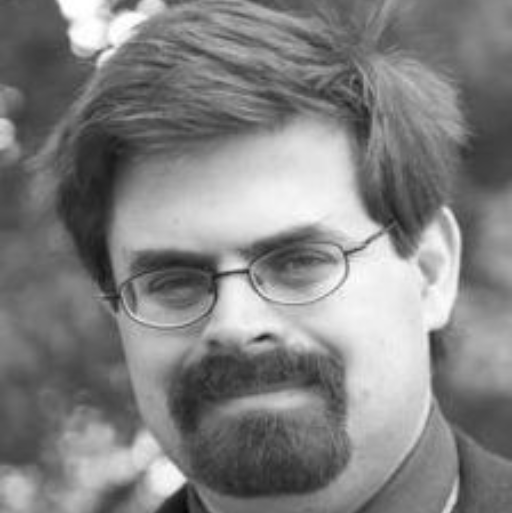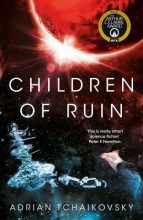Children of Ruin by Adrian Tchaikovsky
What led you into writing?
I’ve had a yen for storytelling since I was young, and it first found an outlet via roleplaying games. When I was around 17 or so, I ran into a series of books called the Dragonlance Chronicles which were basically a retelling of someone’s D&D game (but good, very good, a series I still treasure), and I thought – “I can do that!” It bridged what had seemed an insuperable gap between the person I was and a professional writer. As it happened, I couldn’t actually “do that”, because my early writing was pretty terrible, but it planted the seed and I just kept working on it.
How does a typical day look?
I went full time only in November 2018. Since then, my writing day is to get out of the house to a local coffee place or the café at Waterstones and write for the morning, potter about for the afternoon doing non-writing stuff that needs it, and then usually get another writing session done in the evening. When I was working, I’d write in the evenings and sometimes at lunchtimes if I was doing particularly well. I also write particularly well when I’m travelling – either on the train or at airports.
In what ways do your characters test your abilities?
Most recently for Children of Ruin I wrote some sections from the point of view of very non-human characters, and that nearly broke my head to make it work. For more regular characters it’s usually when they and I have a disagreement over what they would do or how they’d go about things. I plan heavily, but it’s not uncommon for those plans to not survive contact with how the characters turn out.
What’s your setup?
Just a notebook when I’m on the move. At home I have a room that’s a kind of spiral library, and I have a desktop set up in the centre of it. This also contains my insect shrine.
What lasting effects have your favourite authors had on your writing and style?
I read a whole lot, though these days not as much as I’d like. I know I learned a lot from writers I read because I wrote a whole string of books that were basically pastiches of other writers’ styles, although I suspect I’d have hotly denied it at the time. I think this was an essential part of my developing my own style, by absorbing elements and tricks of style from pretty much everyone I read, and from noting scenes that had an emotional effect on me.
What do you do for inspiration?
Aside from the reading, roleplaying games (Live, online and especially tabletop) have always been a big input to turn the wheels of my mind. Beyond that, I tend to absorb knowledge as I go along, and then I find a way to make use of it maybe even years later. (Some research on automated Prisoner’s Dilemma tournaments from around when I was writing Children of Time in 2014 has just become useful, for example).
What repeating themes do you find yourself pulling into your stories?
Nonhuman intelligence, most especially using it as a perspective from which to comment on and critique human intelligence and society; imbalance and abuse of power; prejudice, exploitation, slavery and all the other lovely ways people screw over other people; animals, particularly invertebrates; the doomed heroic charge; bands of close comrades under fire.
How do you wind down?
RPGs, board games, a handful of Youtube/Twitch channels with really fun chat between presenters; podcasts and audiobooks on the move.
What sort of challenges do you regularly overcome while world-building?
Worldbuilding is absolutely my thing, and it’s more a joy than a challenge. I have the most fun in fitting factions together, working out what everyone thinks of who, thinking over the logical inferences of decisions I’ve made so that the world builds up organically from whatever my initial supposition was.
What’s the most useful advice you could give to an aspiring author?
This is actually an incredibly hard question. Ask any two writers what was useful to them, you’ll get a completely different story. I guess, understand that there’s a crapton of luck involved. I got very lucky when I got in print. I got lucky when Children of Time took off and did so well (around 7 years later). Not that I don’t stand by it as a book, but I know books just as good or better that never clicked with the readership they deserved. So, be aware that it’s a very random business, but simultaneously be ready for when the luck turns up in your favour – no point in catching an editor at precisely the right moment when they’re looking for something new, but having a book that isn’t ready to be read. I would suggest people direct themselves to Gareth Powell, who is a very good writing mentor and communicator of writing.
Tell us about the book you’re promoting.
I’ve had a handful out recently, all on each other’s heels (which happens sometimes with multiple publishers). Children of Ruin is the sequel to Children of Time and expands that universe, jumping off from the situation set up in CoT’s epilogue chapter. Cage of Souls is a standalone set in a dying future where the last city of humanity exiles its criminals to a prison deep in the hostile jungles, one such criminal being the political dissident Stefan, your humble narrator and witness to the end of the world. Finally, Walking to Aldebaran is a novella about an astronaut who’s part of a team going into a huge alien artefact discovered out around the orbit of Pluto who gets very lost and undergoes something of a transformative experience on the way out.
👋 Hi! I run Author Interviews
As a new writer I found myself itching to contribute to a thriving, creative community, so I made Author Interviews and I've met loads of wonderful people in the process. You can buy my debut fantasy RINGLANDER: THE PATH AND THE WAY from Amazon.


 Audible
Audible


